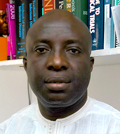
Neil W. Schluger, M.D., was named dean of the School of Medicine in July 2023. An internationally recognized pulmonologist, Dr. Schluger previously served as the Barbara and William Rosenthal Chair* of the Department of Medicine and professor of medicine at NYMC and director of medicine at Westchester Medical Center since 2020.
Since joining NYMC, Dr. Schluger has distinguished himself as a clinician, researcher and educator, leading a department of more than 425 faculty members and teaching more than 800 medical students and residents. In 2021, he took on the additional role of associate dean for clinical and translational research for the SOM.
Previously, Dr. Schluger served as chief of the division of pulmonary, allergy and critical care medicine at Columbia University Irving Medical Center; professor of medicine, epidemiology and environmental health sciences; director of the Population and Global Health Track for the Scholars Projects Program; and co-director of the Programs in Education and Global and Population Health for the Vagelos College of Physicians and Surgeons at Columbia University.
Dr. Schluger is a founder of the East Africa Training Initiative in Pulmonary Medicine (EATI). The two-year fellowship training program in pulmonary and critical care medicine, which recently marked its tenth anniversary, is the first training program of its kind in Ethiopia and the broader East African region. Before the launch of EATI, Ethiopia had only one pulmonologist for its 110 million people. EATI has, thus far, graduated 18 specialists, including two pediatric pulmonologists and two physicians from Rwanda and Tanzania, who have assumed leadership roles at hospitals across East Africa.
He has been a principal investigator in the Tuberculosis Trials Consortium, an international collaboration sponsored by the U.S. Centers for Disease Control and Prevention (CDC) for 25 years and was the chair of the consortium from 2000-2016. Dr. Schluger has been an author or editor of several editions of The Tobacco Atlas, the definitive work describing the extent and consequences of the global epidemic of tobacco use, published by Vital Strategies and the American Cancer Society. He. also serves as a member of the board of trustees at Vital Strategies, a global not-for-profit organization devoted to public health issues.
Dr. Schluger is the author of more than 200 articles, chapters and books. His work has been published in The New England Journal of Medicine, The Journal of the American Medical Association, The Lancet, and The Lancet Respiratory Medicine, among other leading journals. Dr. Schluger is an associate editor of The American Journal of Respiratory and Critical Medicine. He is a past chair of the American Lung Association of New York and past chief scientific officer of the World Lung Foundation. Dr. Schluger was recently recognized by Crain’s New York Business as a 2023 Notable Health Care Leader.
During the COVID-19 pandemic, Dr. Schluger rose to the occasion and became a voice in the media on re-infection, long-term symptoms and the use of hydroxychloroquine for treating COVID-19. He was an author of the lead article, “Observational Study of Hydroxychloroquine in Hospitalized Patients with COVID-19,” published in The New England Journal of Medicine, May 7, 2020. Dr. Schluger used data from an observational trial he led where 1,400 COVID-19 patients were given hydroxychloroquine and showed that there was no evidence that the drug had any benefit of the patient’s conditions.
Board-certified in pulmonary disease and internal medicine, Dr. Schluger is a graduate of Harvard College and earned his medical degree from the University of Pennsylvania and completed a residency in internal medicine and served as chief resident at St. Luke’s Hospital in New York. He later completed a three-year pulmonary and critical care medicine fellowship at The New York Hospital/Cornell Medical Center.
































